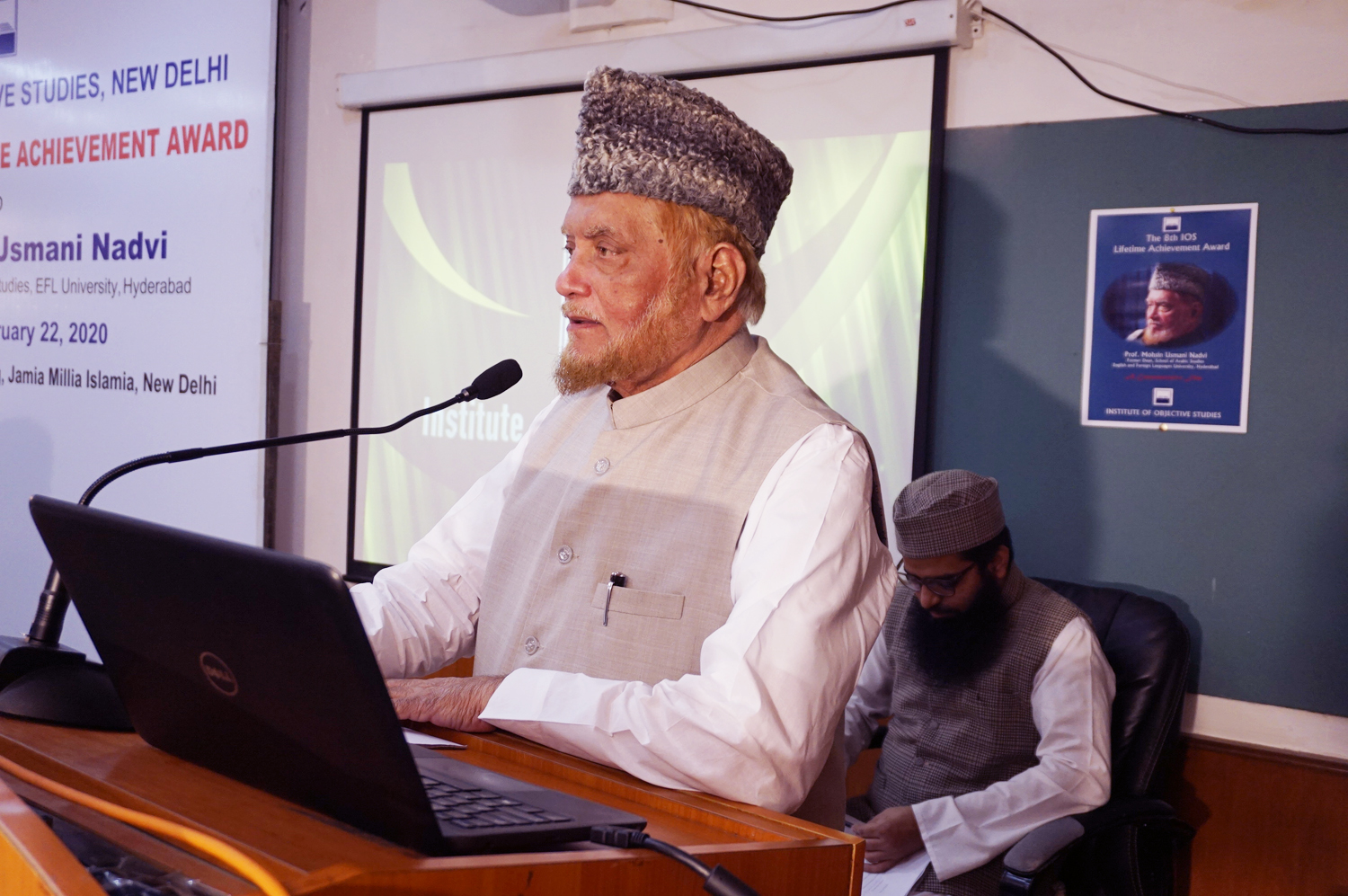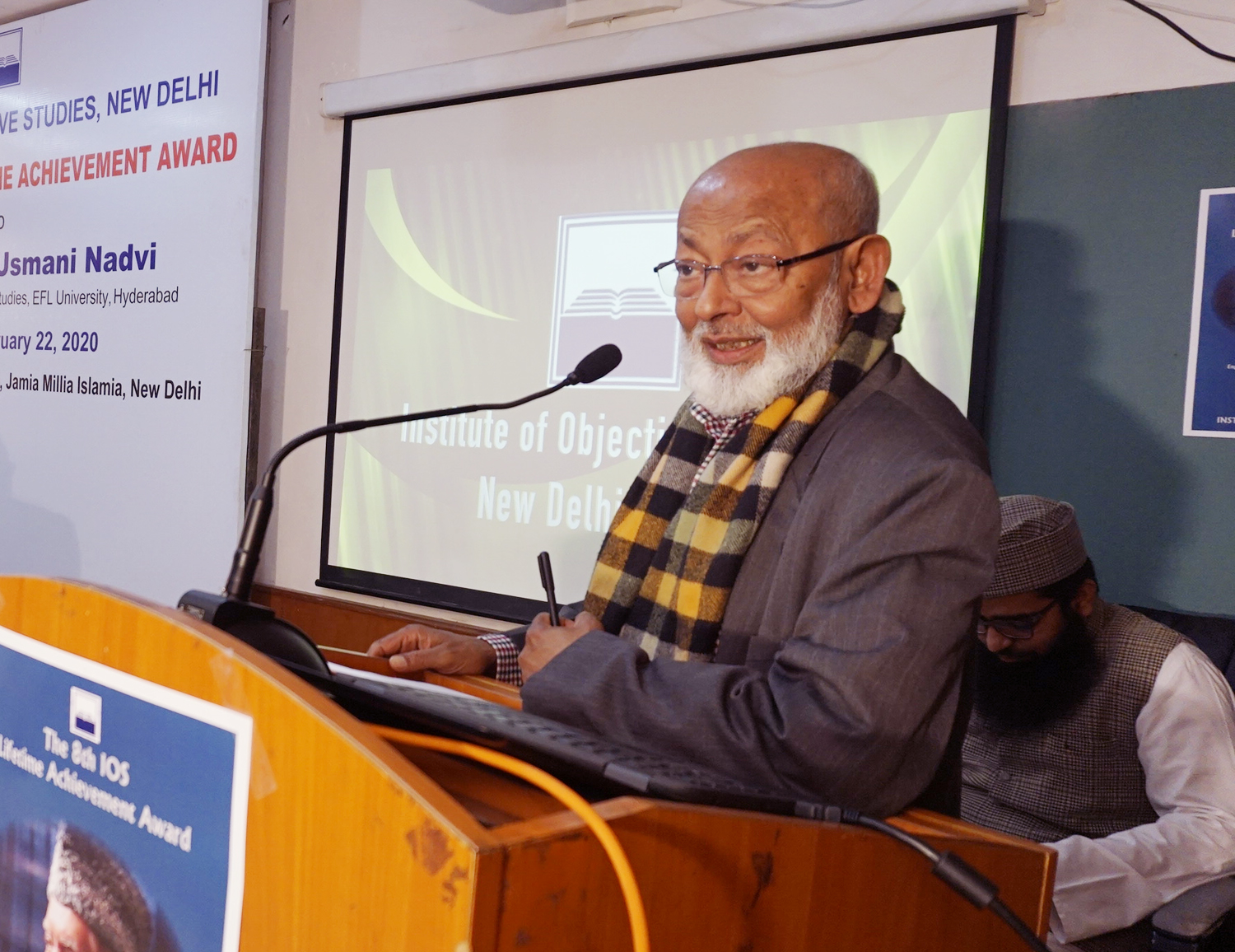Eighth IOS Lifetime Achievement Award Presented to Prof. Mohsin Usmani Nadwi
February 22, 2020 at Conference Hall, FTK-CIT Building, Jamia Millia Islamia, New Delhi

Former dean, School of Arabic Studies, English and Foreign Languages University, Hyderabad, and Islamic scholar, Prof. Mohsin Usmani Nadwi, was presented the Eighth IOS Lifetime Achievement Award at an impressive ceremony organised by the Institute of Objective Studies at the Conference Hall, FTK-CIT Building, Jamia Millia Islamia on February 22, 2020.
The function began with the recitation of a verse from the Holy Quran by Hafiz Athar Husain Nadwi, who also translated it into Urdu. It was followed by the welcome address and the introduction of the IOS by the secretary-general of the Institute, Prof. Z. M. Khan, who said that a lot of work had been done during the last 33 years of its existence. Remarking that reward of good work meant more work, he added that the work had gone beyond the boundaries defined earlier.
These included field research, action research and epistemological research. Explaining the methodology for selection of research projects, he noted that the sanction was granted after approval by an expert committee put in place for the purpose. Details regarding procedure of selection were available on the Institute’s website.
He informed that the decision to publish important works in regional languages was being given practical shape with several of them having come out. Referring to journals being regularly published by the Institute, he said that these included the Religion and Law Review, Journal of IOS, Mutaleaat, IOS Khabarnama and IOS Newsletter in English and Urdu. Online magazines included Current Affairs and the Minaret.
The IOS also awarded scholarships to meritorious but poor students pursuing Ph.D and post-doctoral research in order to fill the deficiency left by the University Grants Commission (UGC). The IOS also had five chapters where lectures, symposia and seminars on regional issues were regularly organised. Besides, the Institute was engaged in holding national and international seminars and conferences on topical issues, like electoral reforms, educational reforms, awqaf etc. Started in 2007, the Lifetime Achievement Award had been bestowed on several personalities. He sought cooperation of all in the endeavours being made by the Institute.
While the former radio news presenter S. M. Shafiq read out the citation detailing Prof. Usmani’s scholastic feats, the vice president, All India Muslim Personal Law Board, Maulana Jalaluddin Umri, presented the scroll of honor to him. A cheque for one lakh rupees, the amount carried by the award, was presented to him by Prof. Z. M. Khan.
The chairman of the IOS, Dr. M. Manzoor Alam, released a 16-minute film on Prof. Mohsin Usmani Nadwi’s life and works which was screened immediately afterwards. He also presented a memento to Prof. Usmani.
Addressing the audience as the guest of honour, Maulana Umri recalled his association with Prof. Usmani at the Aligarh Muslim University where both of them were students. He said that Prof. Usmani always thought of issues and tried to find solutions to them as a scholar. In his thoughts, he looked like the renowned Islamic scholar late Maulana Syed Suleiman Nadwi. Whatever he thought, he never let it be out. He always called a spade a spade and never went back on it. He restrained himself from referring to irrelevant things. He was truly performing his duty to take Allah’s message to the people, the Maulana added.

In his reception address, Prof. Usmani described the IOS as a secular institution. Its work was the hallmark that Allah accepted. He said that the Institute deserved a big award for its extraordinary service to knowledge and society. Underlining the need for mass contact with the non-Muslims to dispel misconceptions about Islam, he said that past mistakes in this connection must be rectified. He regretted that most of the organisations working in the fields of Muslim awakening lacked the initiative to engage with non-Muslims. Quoting a couplet of the famous Urdu poet Faiz Ahmad Faiz, he said that his association with the IOS was long and he was unable to pay the debt he owed to the Institute.

Presiding over the function, Dr. Mohammad Manzoor Alam, held that by honouring Prof. Usmani the Institute was celebrating the best traditions of scholarship in India. In every way, Prof. Usmani was an inspiration and a role model for the present and coming generations. He said that Prof. Usmani’s inspiration came from men and women of eminence, individuals and organisations that represented the democratic spirit of India whose thought, work and life exemplified excellence and dignity. For the young nation, role models were needed who stood for harmony and represented the diversity of the country.
He added that IOS had been working tirelessly for social equality, human rights and religious freedom for all citizens. IOS saw the Indian Constitution as a fountain-head of empowerment, rights and privileges for all Indians. Referring to legacy, he said that it meant doing something tangible for the future so that questions raised by younger generations could be answered. As far as the protection of human dignity was concerned, compared to Christians, Muslims did the least work.
Listing the initiatives taken by the IOS, he said as many 122 booklets had been planned for 18-36 years age group under the series “Allah Hi Ka Kalaam Buland” to explain basic tenets of Islam to them. Each booklet consisting of 20-24 pages would be translated into 19 regional languages. He asked scholars to help this project with their valuable advice. Commenting on the Preamble to the Constitution, he said that it reflected the Islamic teachings of liberty and justice.
The IOS had published four books on minorities, but the number of non-Muslims who purchased them was greater than the Muslims who did so. He asked the scholars to view things from an objective prism as the age was amenable to change. He also said that Islam was not for Muslims only, but it encompassed all humanity. Everybody who adopted Islam would benefit from it.
As a think tank IOS was constantly striving to build bridges between academicians, intellectuals, activists, legislators, policy-makers and young intellectuals.
Another area that had been prioritised by the Institute was the publication of books on various subjects, with so far 500 titles to its credit. He informed that a survey on “What the Indian youth aspires for and expects from its political leadership?” by Dr. Amirullah Khan for the Institute of Objective Studies was underway and likely to be ready by coming May. While urging the audience to make the concept “We” as enshrined in the Constitution, more pronounced, he called for support to those who were fighting to save the Indian Constitution.
The proceedings were conducted by Shah Ajmal Farooque Nadwi, in-charge of Urdu section, IOS. Former vice-chancellor of Magadh University, Bodh Gaya, and member of the general assembly of the Institute, Prof. M. Ishtiaq extended a vote of thanks.
Go Back